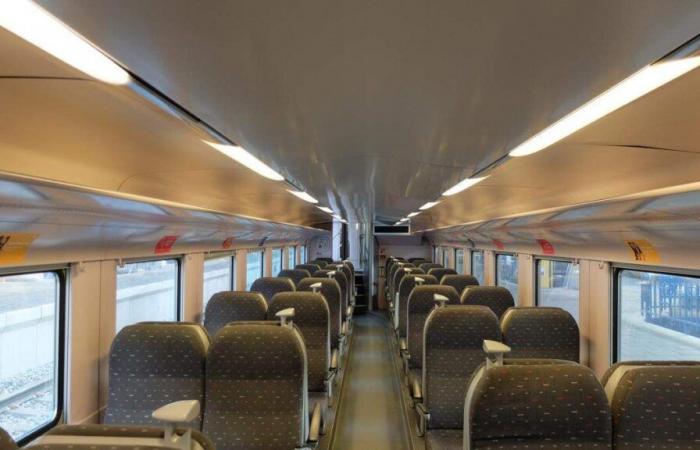Say “Goeie morgen”, not “goeie morgen, hello”. For having demonstrated bilingualism, a train controller finds himself with a complaint and a political controversy on his hands.
The incident took place while the train was traveling through Vilvo(o)rde, a small town located north of Brussels, but in Flemish territory. The controller greeted the passengers with a “goeie morgen, hello” before starting to validate the transport tickets. It was then that one of them pointed out that in Flanders, we say “Goeie Morgen”, and that’s all! (punt aan de lijn!). He filed a complaint with the SNCB. The information was picked up by the press. Politics got involved.
The rule requires that the railway company SNCB respects the legislation on the use of languages in administrative matters. In other words, in Flanders, the controller should have been content to speak Flemish. The very courteous and very bilingual Sammy Mahdi, the president of the Flemish Christian Democrats of the CD&V, says nothing else: “All my sympathy for this train attendant who certainly had good intentions but, as a public authority, we cannot cannot throw our linguistic legislation overboard like that.”
The customer is king, whatever their language
This is not the opinion of the ecologist Georges Gilkinet, Minister for Current Affairs of Mobility, still in charge of the SNCB since Belgium does not yet have a federal government. In the Chamber, he pleaded for more pragmatism: “In a territory as small as Belgium, our trains run on the same route from Antwerp to Charleroi or from Liège to Ostend, via Brussels. In addition, we can be pleased that many tourists, particularly French and Dutch, use the train to go to Bruges or Dinant,” he explains to the French-speaking daily. The Future. He continues: “It makes little sense, among other things from a business point of view, not to inform them in the language they understand. Why not welcome travelers who take the train to the station of our national airport… located in Flanders, in Dutch, French and also English? Why not welcome travelers in Dutch and French who board a station in Flanders and head towards Brussels or Wallonia? And vice versa?
Common sense? Not for the Flemish Christian Democrat Sammy Mahdi who believes that twisting the existing rule would lead to discouraging newcomers to Flanders from learning Dutch.
One in two Flemish voters votes for a nationalist party
Seen from the outside, the affair may seem far-fetched. About twenty kilometers from the European institutions and their Tower of Babel, a train attendant will have to be held accountable for having said one word too many in French.
This forgets that linguistic disputes have shaped and still shape Belgium. From the struggle started in the 19th century by the Flemish Movement for the recognition of the rights of the Flemish to the confederalism that Bart De Wever would like to imprint on Belgium. It is also forgetting that one in two Flemish voters votes for a nationalist party which defends tooth and nail the autonomy and language of their region. For the N-VA of Bart De Wever among the “moderates”. For Vlaams Belang (extreme right) among the radicals.
We thought that the community – the linguistic question – had taken a back seat for around ten years, when the N-VA had muted its pretensions to participate in the government of the French-speaking liberal Charles Michel. Several surveys have meanwhile noted that the quarrels between Flemish and French-speaking people no longer interest young people in the north of the country, convinced that it is more useful to present themselves as Belgian internationally, rather than playing the regionalism card. narrow.
What has just happened on the rail shows that not everyone is of this opinion. That there still exists a certain Flanders straddling rules intended to put an end to French-speaking cultural hegemony. In the same spirit, a Flemish civil servant will refuse to speak French in so-called “facilitated” municipalities – where French speakers enjoy a special framework for living among the Flemish. Or a restaurateur from the Belgian Coast/Vlaamse Kust will be reluctant to speak French with tourists from the south of the country….
“A cultural marker”
A columnist from the French-speaking public channel RTBF sees in this bickering a “cultural marker”: “I think that this kind of controversy is much more than a quarrel: it is a cultural marker. Yes, this kind of controversy only belongs to us. Nowhere in the world is a guy going to file a complaint about ‘Goeiemorgen, hello’.” However, in this world that has become liquid, where identities seem to dissolve, there is an undeniable attraction for typicality, for what brings us back to our Belgian singularity (…) We take refuge in the futile. »
But rules exist. This is how we learn that the order of announcements in two languages is reversed every other week in Brussels-Centra(a)l.
The columnist continues: “It’s quite interesting, I find, that this story happens to a train attendant from an immigrant background, bilingual and ultra-connected. Quite the opposite of the arrogant and anti-Flemish French speaker. A concentrate of a changing Belgium and which proudly claims to say “Goeiemorgen, hello” to Vilvoorde or Charleroi. He is supported by SNCB, which will not pursue the complaint. This is undoubtedly what matters most, ultimately: controller Ilyas Alba won. He can continue to say “Goeiemorgen, hello”.
The railway company considers that “the current regulations are not sufficiently oriented towards the traveler”. She supports her controller. The customer is king.






